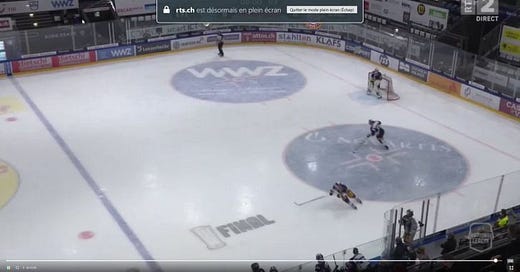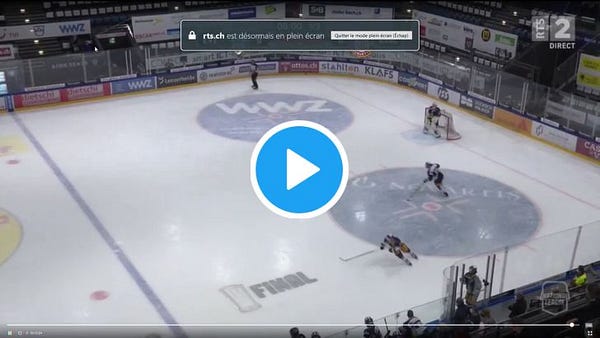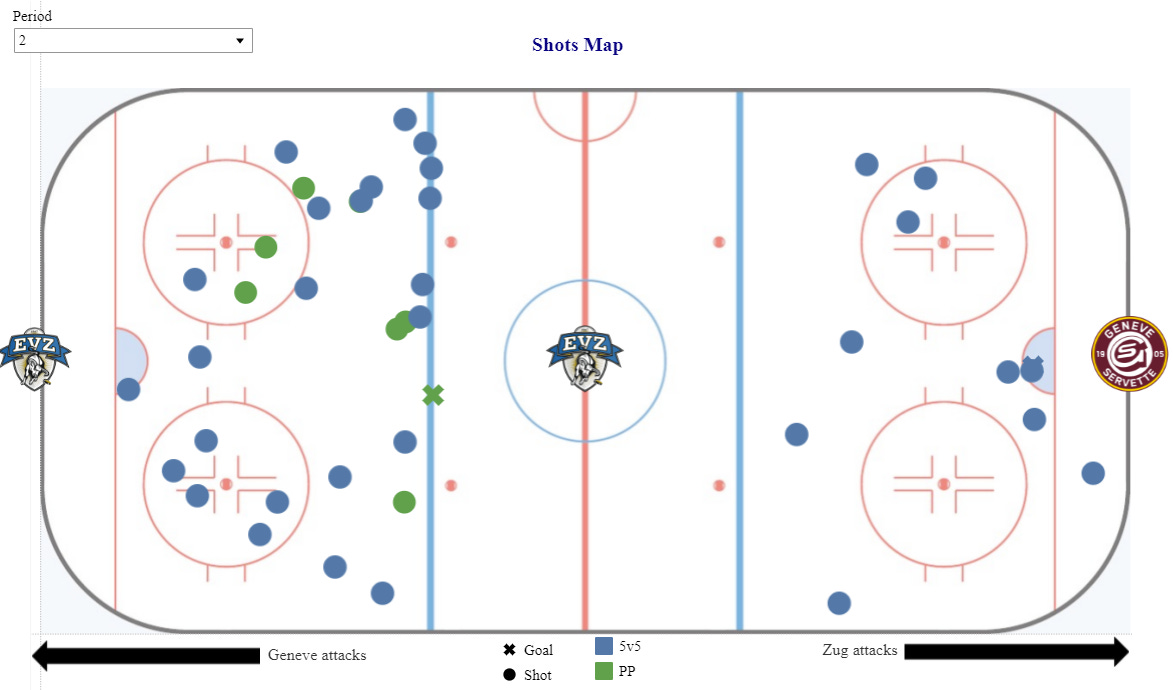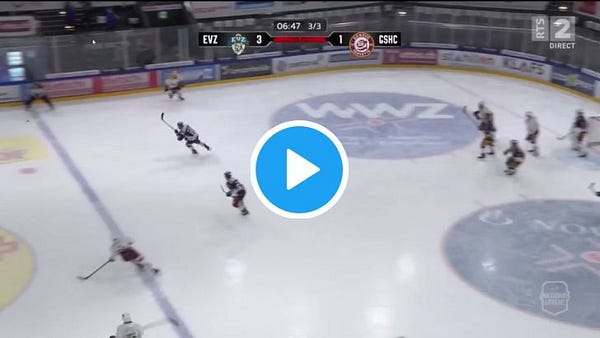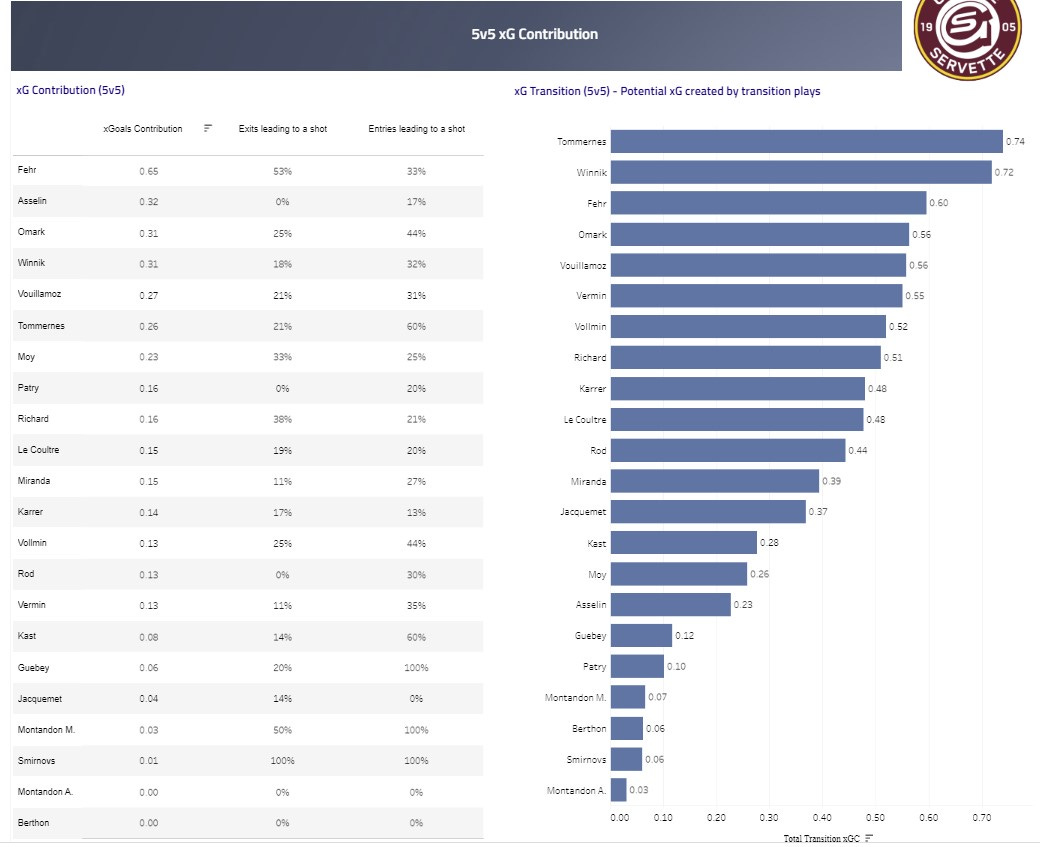In our first two articles (Game 1 and Game 2) of this series, an in our series preview, we warned: “Prepare for a quest toward defensive perfection as this series will be played inside the slot, and and it will be up to whichever makes the fewest mistakes.“ Yes, we want to keep it simple and repeat it again.
This was a key to Zug’s title as it was during the regular season when it finished first. Zug was solid and didn’t give Geneva much room to operate in their slot, especially at 5v5. Except for a some minutes during the second period of this third game, Geneva wasn’t able to sustain pressure for long periods. And when Zug’s defence made some errors, Genoni was there, acting like his usual self during the playoffs.
The first period
During the first period, Zug had the most shot attempts and the biggest number of chances, but Geneva probably had the best chance overall on the power-play, when Fehr found Genoni on a rare rebound. At 5v5, Geneva only had 5 shot attempts. The most dangerous one came from Fehr, their most active player, on a … behind-the-net pass from Miranda.
Zug had, 19 shot attempts at 5v5. Senteler was Zug’s most active player with 3 shots from the slot, for a total of 0.63xG in a 15 seconds sequence. He tried to capitalize on rebounds from Manzato on chances originating from the defencemen at the blue line. At the end of the period, Albrecht nearly opened the score on a rush chance. Klingberg was able to easily enter the offensive zone, thanks to a bad gap control (space between the defenceman and the forward entering the zone), and feed Albrecht on a Royal Road pass.
Lastly, let’s appreciate Hofmann’s first rush of the game.
After 20 minutes: 1.07 expected goal (xG) for Zug, 0.56xG for Geneva.
With a 18% success rate on zone entries in control for Geneva during this period, they were completely blocked by Zug’s defensive play, as confirmed by Kast below (interview in French from Patrick Andrey, RTS).


The second period
This second period was maybe Geneva’s best during the whole series. This was a period where Geneva was able to generate some sustained pressure in Zug’s defensive zone from the start. Unfortunately for Geneva, on a good offensive zone entry by Simion and Kovar at the beginning of the period, Hofmann was able to score. Kovar perfectly launched Simion, who was able to drive to the net and create a rebound for Hofmann, which had to take three shots before scoring. He was surprisingly left alone in front of Manzato by the Le Coultre-Karrer defensive pair. On this sequence, Zug scored a goal and generated 1.33xG. This kind of sequence only happens a few times during a whole season.
If we except a breakaway from Martschini, (irrgularly?) stopped by Kast, Geneva controlled the play with 30 shot attempts in its favor, against 11 for Zug. Yet, an important part of their plays started at the blue line. Geneva was trying to create tips, to generate rebounds, but was finally unable to do so as Zug controlled the slot quite efficiently, despite the pressure. On the power-play at the end of the period, Geneva finally scored pn that type of play, with a Tömmernes’ shot from the blueline.
After 40 minutes: 2.46 expected goals (xG) for Zug, 1.45G for Geneva.
The third period
Zug had a great period start with a power-play early in the period, but Geneva had the best chance with Fehr, again, alone in the slot. He screened Genoni on a shot from Rod and was able to pick up Genoni’s rebound. But Genoni was on a mission and prevented Fehr from scoring.
That was it for Geneva in terms of big chances. They had some at the end of the game, but Zug already had a comfortable lead.
During the rest of this period, there was only one team on the ice. It started with Klingberg left alone in front of Manzato after a faceoff. Then, we saw Hofmann’s game-winning goal. A McDavid kind of goal. It will one of the most memorable 2020/21 playoffs goals.

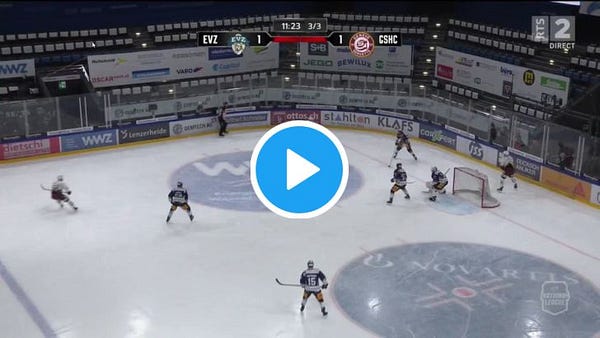
Less than 20 seconds later, and a 2+2 penalty against Winnik, Klingberg scored again, putting Zug in a great position to manage the end of the final. A few minutes later, Hofmann had another great rush and found Manzato’s post.
Then Zug scored again on the power-play with Albrecht and Simion had an empty-net goal. It was then 5-1 for Zug for a well deserved title.
By the numbers
Zug ends the game with 4.52xG, their best performance of the series happening at the best time possible, which sums up that team pretty well. Yes, Geneva tried, with 1.98xG but let’s remember that creating less than 2xG in any hockey game is more a failure than anything else. Historically, Zug had 84% chances of winning this game, the maximum possible for a home team.
77% in game 1, 82% in game 2, 84% in game 3. If the score of each game long remained uncertain, it is clear that Zug deserved the win every time.
Over the series, Zug created 10.5xG, for only 5.49 for Geneva, almost twice as less. Of course Genoni saved goals, but Manzato too. The initial difference between the two teams remained undoubtful.
The Goals map tells a lot. In our battle for the slot, Zug scored their 7 “real” goals there… At 5v5, Zug also created exactly 2xG through high-danger passes, for… 2 goals scored. And Geneva 1.05xG. Let’s add 10 rebounds to 4 for Zug, 39 rush shots to 21, 2.27xG off the rush to 0.83, 1.50 to 0.64 on Walk-ins, etc.
In transition, both teams have been pretty on the same level, at least on the surface for controlled plays. 64% and 61% of controlled exits, easy, 48% and 49% on entries. But the edge for Zug was around dump-ins, made a necessary evil as the blue lines were locked.
Zug recovered 25 of their 65 dumps: 38%. Geneva only recovered 13 of their 71: 18%. Much more opportunities to create offensively for Zug.
A Perfect Genoni
He was maybe less easy in his saves tonight, but Genoni still saved 1.25 goal tonight, bringing his total to 3.8 over the series, with a 97.5% save% and 81% Shot control. Mind blowing.
Beyond how much Zug dominated that series, Genoni was the cherry on the cake to make the task impossible for Geneva. A real dream breaker.
But let’s salute Daniel Manzato, who didn’t regress. Despite his 4 goals allowed tonight, he still saved 0.13 for his team, as he faced a barrage of 4.13xG. With 3.1 goals saved in three games, Manzato was superhuman too, with a lot of helps from his posts till the end… His Shot control ends at 68%, sliding down near league average. But he didn’t blow up. Let’s remember that great story of the back up became hero.
Zug collective strength was their main weapon
It is almost useless to come back on the elite performances of Kovar and Hofmann. On this game 3 like the ones before, Zug depth was on display. Over the series, Klingberg led on creation from transition with his 11/14 on exits (79% controlled) and 13/18 on entries (61% controlled). Next come Martschini and Zehnder. Senteler ranks 3rd for xG Contribution, Albrecht 5th. That depth allowed the defensemen to focus on their part, without having to overdo. We barely saw Diaz going deep in the offensive zone all series long.
One disappointment: Shore moved the puck a lot but it didn’t lead to much: 0.02xG Contribution in 3 games.
Hofmann scored 3 goals on his 2.37xG. Simion 3 on 1.86xG. Klingberg and Diaz tried the most with 20 shot attempts, Hofmann had 19 and Simion 14. Kovar led the team with 8 shot assists, Senteler and Simion end with 7. Everybody played their part as expected.
For the Grenat, Tömmernes tried. We keep saying that but all three games looked very much alike. He moved the puck a lot with 28 exits (64% controlled) and 10 entries, 6 of which led to a shot. Winnik follows him closely in termes of impact. Fehr ends with the most xG Contribution, thanks to his shooting (1.41xG on 16 attempts). Only Tömmernes tried more with 22 shot attempts. But Fehr’s indiscipline will overcome most of it in our memories for sure. Omark played as well as expected. He is tied with Rod for second in the team with 0.59xG from his shots, despite one less game played. The Swede was dangerous and maybe the only one capable to split the defensive structure of Zug at any time.
But behind that group of leaders, the rest of the team could not compete with Zug.
Who should be MVP?
In our preview, we didn’t know who could be MVP for Zug and the three games did not help… Genoni was impressive but the team in front of him helped a lot to ease the burden. No defenseman had to be impressive. So, if we had to pick among forwards, Jan Kovar seems the most likely candidate. Just dominating on possession, a game breaker offensively, physically engaged from the first to the last minute.
But the true hero is certainly Dan Tangnes, the brain behind a team that rolled over the league while playing a smart and entertaining brand of hockey. A game based on speed, control of the puck, individual and collective decisions based on a quest to be the most effective in any situation. Respect.


You can also follow us on our Twitter pages here and here or subscribe to our newsletter below if you don’t want to miss our coming articles.
Find more statistics tracked by Thibaud on his Tableau’s page here: https://public.tableau.com/profile/thibaud.chatel#!/vizhome/NLAPlayoffs2021/GameReport
Or some more statistics on NL Ice Data here: nlicedata.com
